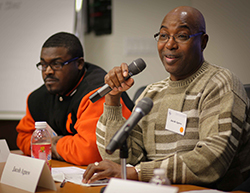Improving the Lives of African American Males in the Child Welfare System
AIR is currently designing training opportunities and identifying best practices and model programs focused on improving the lives of African American males in the child welfare system. The goals are to assist foster parents in supporting positive outcomes for the children and youth in their care and to help judges, juvenile court staff, and child welfare providers make quality referrals for placements and services.
 Jacob Agnew (R), with Malcolm Evans, talks about his experience as a foster parent.
Jacob Agnew (R), with Malcolm Evans, talks about his experience as a foster parent.
These next steps stemmed from feedback received during a two-day conference at AIR headquarters in January. Fifty-five foster parents, foster youth, family members, practitioners, and researchers participated in a discussion focused on components of programs that promote resiliency and reduce the disproportionate number of African American males in the child welfare system, including:
- Using a strength-based framework during case management;
- Building protective factors to improve social and emotional well-being;
- Understanding the developmental and lived experiences of young African American boys;
- Addressing institutional race, bias, and disparities when developing services; and
- Implementing workforce development strategies to build core staff competencies.
The meeting was hosted by the Technical Assistance Partnership for Child and Family Mental Health—a collaboration between AIR and the National Federation of Families for Children’s Mental Health—with the Center for the Study of Social Policy and co-sponsored by the Administration on Children, Youth, and Families (ACYF) and the Substance Abuse and Mental Health Services Administration (SAMHSA) of the U.S. Department of Health and Human Services. Bryan Samuels, Commissioner of ACYF, and Gary Blau, Chief of the Child, Adolescent, and Family Branch at SAMHSA, expressed support for expanding services and evaluating data to improve well-being for African American males in the child welfare system.
 Michael Simelton, Antron McCullough, Robert Whitlock, and Sixto Cancel (L to R) spoke about their personal experiences in the foster care system during an afternoon panel.
Michael Simelton, Antron McCullough, Robert Whitlock, and Sixto Cancel (L to R) spoke about their personal experiences in the foster care system during an afternoon panel.
Foster parents and foster youth, in addition to youth who have transitioned out of foster care, shared their first-hand perspectives about important program components, including the necessity of understanding the impact of trauma on African American males and provide trauma-informed services; the importance of caring adults and quality interactions with case workers; and the necessity of effective mental health services that understand and can relate to cultural, community, and family experiences.
As a result, through training and program efforts, AIR is examining how education, behavioral health, juvenile justice, and primary health systems can be strengthened to enhance positive well-being for African American males in the child welfare system. AIR is also identifying strategies and interventions to catalyze change for African American males in the child welfare system, including addressing institutionalized racism and disproportionalities and providing effective and responsive mental health, aging-out, and independent living services.